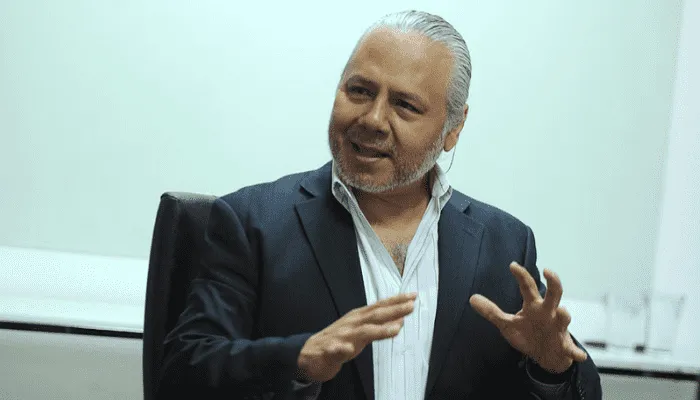“The reform was made without any transparency,” declared this morning the constitutional lawyer, Enrique Anaya, assuring that “this was already arranged” and that yesterday’s plenary and the two weeks that the Ad hoc commission spent studying the proposal presented by the Executive, was “a show.”
According to the jurist, for the analysis of the document, the commission did not take into account all the sectors involved in the pension system (employees, employers, AFP, Government, and NGOs), but only its “applause committee,” inviting the unions “related to them.”
“The National Association of Private Enterprise (ANEP), the Chamber of Commerce, the Association of Industrialists, and other unions were not asked their opinion,” expressed Anaya; even though the reforms establish a 1% increase in the employers’ contribution, which would add up to more than $90 million annually.
“They know this is not going to work,” said the lawyer, suggesting that these institutions have kept quiet “out of fear of the government” and to avoid reprisals.
Anaya also questioned the actuarial studies that the deputies claimed to have since, according to him, each study takes 2 to 3 months to be done and has an approximate cost of $50,000, for which reason, he states that the Assembly can’t have 176 studies for the pension reform.
And if it is true, he explains why they are not known. “I can bet that those actuarial studies reflect that the project approved yesterday is not sustainable in time, and that is why they hide them,” he said.
The jurist also exposed that the new law’s wording is ambiguous and that several essential details of its application have been “hidden” in the other secondary documents.
For Anaya, the approved bill does not comply with the four dimensions of the pension system: sufficiency, sustainability, coverage, and equity.
The main flaw for the lawyer lies in the equity issue since, according to the reforms, all pensions would have a 30% increase, which for Anaya is not fair. “Equity should be that the highest pensions should not have to be given such a large subsidy.”
Likewise, yesterday, the president of the Assembly, Ernesto Castro, affirmed that “no one will be able to earn more than three thousand dollars,” including those people who previously had a higher pension; however, Anaya assured that the law did not contemplate the retroactive effects of the same, thus provoking one more topic of debate: the modification of acquired rights.
Regarding the coverage, the constitutionalist affirms that “there is no measure to improve it,” considering that in El Salvador, only one out of four people contribute. In the end, only 35% manage to get a pension.
In conclusion, Anaya states that the new Comprehensive Law of the Pension System is regressive and unsustainable. And that workers “will not have a return on their savings.”
“La nueva ley de pensiones es regresiva e insostenible”: Enrique Anaya, abogado constitucionalista
“La reforma se hizo sin ninguna transparencia” declaró esta mañana el abogado constitucionalista, Enrique Anaya, asegurando que “esto ya estaba arreglado” y que la plenaria de ayer y las dos semanas que la comisión Ad hoc pasó estudiando la propuesta, presentada por el Ejecutivo, fueron “puro show”.
De acuerdo al jurista, para el análisis del documento, la comisión no tomó en cuenta a todos los sectores involucrados en el sistema de pensiones (empleados, patronos, AFP, Gobierno y ONG), sino únicamente a su “comité de aplausos” invitando a los sindicatos “afines a ellos”.
“No se les preguntó su opinión a la Asociación Nacional de la Empresa Privada (ANEP), la Cámara de Comercio, Asociación de Industriales y otras gremiales” expresó Anaya, a pesar de que en las reformas se establece un aumento del 1 % a la contribución de los empleadores, que sumaría más de $90 millones anuales.
“Ellos saben que esto no va a funcionar” dijo el abogado, sugiriendo también que dichas instituciones se han mantenido calladas “por miedo al Gobierno” y para evitar represalias.
Anaya también cuestionó los estudios actuariales que los diputados afirmaron tener, ya que, según él, cada estudio tarda de 2 a 3 meses en realizarse y tiene un costo aproximado de $50,000, por lo cual, manifiesta que no es posible que la Asamblea cuente con 176 estudios para la reforma de pensiones.
Y en caso de ser cierto, apela al por qué no se conocen. “Puedo apostar que esos estudios actuariales reflejan que el proyecto que se aprobó ayer no es sostenible en el tiempo y por eso los ocultan”, expresó.
El jurista además expusó que la redacción de la nueva ley es ambigua y que varios detalles importantes de su aplicación han quedado “escondidos” en los otros documentos secundarios.
Para Anaya, el proyecto aprobado no cumple con las cuatro dimensiones del sistema de pensiones: suficiencia, sostenibilidad, cobertura y equidad.
El fallo principal para el abogado radica en el tema de equidad, ya que, según las reformas, todas las pensiones tendrían un incremento del 30%, lo que para Anaya no es justo. “La equidad debería de ser que a las pensiones más altas no tendrían que darle un subsidio tan grande”.
De igual forma, ayer, el presidente de la Asamblea, Ernesto Castro afirmó que “nadie va a poder ganar más de tres mil dólares”, inclusive aquellas personas que previamente poseían una pensión mayor; sin embargo, Anaya aseguró que en la ley no se contempló los efectos retroactivos de la misma, provocando así un tema más de debate: la modificación de los derechos adquiridos.
En cuanto a la cobertura, el constitucionalista afirma que “no hay alguna medida mejorarla”, teniendo en cuenta que en El Salvador solo una de cada cuatro personas cotiza y al final únicamente el 35 % logra pensionarse.
En conclusión, Anaya manifiesta que la nueva Ley Integral del Sistema de Pensiones es regresiva e insostenible. Y que los trabajadores “no tendrán una rentabilidad en sus ahorros”.

